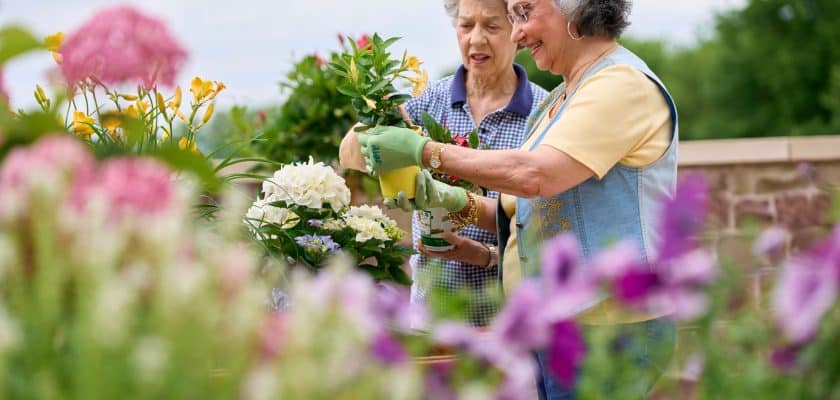6 Ways Gardening Boosts Wellness for Older Adults

The therapeutic nature of gardening has a variety of benefits for physical and mental well-being, making it a great hobby and source of activity for older adults. At The Vista, we have several beautiful community gardens for residents to grow fragrant flowers, flavorful herbs, or fresh veggies. Tending and enjoying the fruits of these gardens is an effective stress reliever, great exercise, and overall wellness booster. Read on for some of the most important ways gardening helps older adults be happy and healthy.
- It lowers stress.
Mental wellness is just as important as physical fitness in older adults – depression, anxiety, and other mental health issues can plague older adults as significantly as medical ailments do. Studies show that practicing a hobby, particularly one filled with fresh air and sunshine, can drastically lower levels of cortisol, which will decrease stress and lower high blood pressure. Getting outside and working with your hands is a great way to combat isolation, feel productive, and enjoy beautiful scenery. The sun’s rays not only stimulate vitamin D production but also boost serotonin levels, which contribute to a sense of calm and happiness. Plus, the feeling of accomplishment when the fruits of your garden bloom is certain to boost confidence and improve mood.
- It increases mobility.
Gardening is a great way to keep muscles moving and blood flowing without exerting a large amount of energy. It is a moderate and hearty physical activity that can keep older adults active who may not have the mobility or energy for more-vigorous workouts. Even light exercise can help keep the body healthy and reduce negative effects of the aging process. Gardening also keeps lesser-used muscles engaged, and can help rebuild strength and mobility following a stroke. However, it is important to stretch before and after gardening tasks to avoid back or neck strain, pulled muscles, or common gardening hand injuries, such as tendonitis and carpal tunnel syndrome.
- It boosts heart health and reduces stroke risk.
Studies have found that low to moderate physical activities such as gardening contribute to a reduced risk of death from heart disease. Regular gardening can reduce the risk of heart attack and stroke by as much as 30 percent for people over 60. Plus, being outside and soaking up the sunlight can increase levels of vitamin D, which research also shows can reduce heart disease risk.
- It improves fine motor skills and sensory awareness.
Gardening on a regular basis can significantly help older adults maintain fine motor skills and improve their endurance and strength. With age, eyesight weakens, sense of touch grows less sensitive, and even brain regions connected with scent can become less sharp. Gardening is a tactile activity rich with sensory experiences, allowing older adults to get outside in the fragrant fresh air and be hands on to plant their flowers, herbs, and veggies in the dirt. Using their hands to plant, dig, weed, and prune is also great for improving dexterity and hand strength.
- It improves brain health.
While Alzheimer’s and other forms of dementia are not fully preventable, research has indicated that certain lifestyle choices may reduce the risk by improving brain function. Engaging in an activity such as gardening can help sharpen critical functions like problem solving, sensory awareness, dexterity, and attention span. Studies have found that gardening can reduce the risk of dementia by as much as 36 percent. For older adults who already have dementia, taking up gardening as a hobby is often suggested to help alleviate symptoms.
- It provides a sense of purpose.
Keeping busy with a productive hobby is a great way to create a sense of purpose. The satisfaction gained from caring for and watching plants grow and flourish can be significantly rewarding and provide a strong sense of fulfillment and accomplishment. Plus, taking up gardening is a great way to learn new things, since caring for plants effectively requires following certain steps correctly and combating issues as they arise in order for them to thrive.
Interested in learning more about The Vista?
If you love to garden, The Vista may be the CCRC for you! Our beautiful community features five raised garden beds for shared resident use – two on the patio outside the nature conservatory with a breathtaking view of The Ramapo Mountains and three on the main patio. Residents plant various flowers, veggies, and herbs in the community beds and enjoy getting their hands dirty tending to and watering their blooms. The Vista also holds planting classes for residents who are not already blessed with a green thumb to learn more about this gratifying hobby.
To learn more about CCRC living at The Vista, call (201) 848-4200 or provide your contact information using our quick and easy form.

